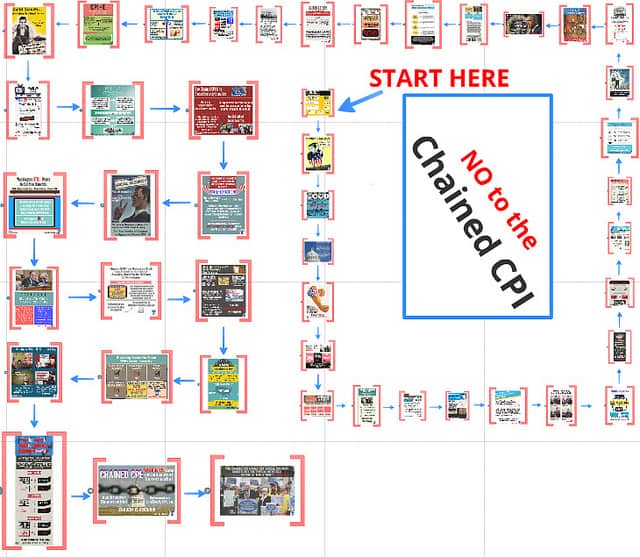Americans Do Not Support A Broad Agreement to Cut Benefits in Order to Preserve Social Security
Quote:



Source: Reining In Health Care Costs Key To Trimming Deficit
Reporter: John Ydstie
Correction:



Seniors and the State of the Union
Here’s reaction to last night’s State of the Union address from National Committee President/CEO, Max Richtman:
“American families, across generations, will be encouraged to see our President acknowledge that job creation and economic insecurity are among the greatest challenges facing millions of average Americans. President Obama is right, too many have been left behind and still face unemployment, stagnant wages and an insecure future, even as the economy recovers. The President’s promise of a year of action to restore the basic bargain that built this country should also include preserving and strengthening the nation’s retirement and health security programs, Social Security and Medicare.
While we support proposals that encourage independent savings strategies, the surest and most time-tested path to economic security for older Americans is through the Social Security program. We urge the President to use his power and influence to boost the nation’s retirement system which has successfully served millions of Americans for more than 78 years.
Social Security benefits are not keeping pace with the cost of living in America. The average monthly benefit of $1269 is akin to a monthly paycheck for a worker on minimum wage. While the President is committed to raising the federal minimum wage to $10 per hour for workers, we would also like to see the President support an increase of $70 per month in Social Security benefits for retired workers as proposed by Senator Tom Harkin and Congresswoman Linda Sanchez in S.567 /H.R.3118. This benefit improvement could be paid for by lifting the payroll wage cap.
Rather than calling for benefits cuts through proposals like the Chained CPI, we should be talking about boosting benefits, adopting the more accurate consumer price index for the elderly (CPI-E) and increasing the minimum benefit formula. We urge the President to remember that reducing already modest benefits to seniors isn’t the path to economic security. The future of America’s retirees must remain a part of this debate. “…Max Richtman, NCPSSM President/CEO
Celebrating Our Social Security & Medicare Successes
We’ve seen a constant threat to Social Security and Medicare benefits coming from Washington over the past many years. While the war to preserve and strengthen these vital programs certainly isn’t over (for example the President’s budget, the debt ceiling fight, are still ahead in 2014), it’s important to celebrate the battles we have already won. And they are many. Thanks to our vigilant NCPSSM activists for their hard work in reminding Washington why the vast majority of Americans of all ages and political parties do not support cutting benefits.
30 Years of Fighting and Winning to Protect Your Benefits
2013
A year of fiscal crises repeatedly threatened benefit cuts to Social Security and Medicare. The National Committee successfully prevented a Social Security Cost-of-Living Adjustment (COLA) cut and an increase in the Medicare eligibility age from being written into the fiscal cliff bill. We also defeated efforts to continue the two-year-old Social Security payroll tax holiday that was undermining the Social Security system.
The National Committee launched a nationwide pilot to inform America’s same sex couples of their new rights to Social Security benefits after the Supreme Court’s Defense of Marriage Act decision in 2012.
Joining with other advocates, we delivered more than 2 million petitions to the White House protesting President Obama’s plan to cut Social Security benefits through the Chained CPI.
2012
NCPSSM President/CEO, Max Richtman, met with President Obama and other national leaders at the White House to talk about fiscal challenges facing the nation. He urged the President to preserve Social Security and Medicare benefits in ongoing budget debates.
We stopped a proposal to increase Medicare premiums from becoming part of legislation to extend the Social Security payroll tax holiday.
2011
The Congressional “Super Committee” hoped to solve the federal debt crisis by cutting Social Security, Medicare and Medicaid, but thanks to our lobbying efforts, a national ad campaign and the work of our grassroots activists, the Super Committee adjourned without reaching consensus on any plan to cut benefits.
The National Committee helped win the battle to save traditional Medicare from the House Budget Committee Chairman’s dangerous proposal to privatize the program. Privatization benefits insurance companies at your expense, making it harder for seniors to choose their own doctor while cutting prescription drug, preventive care and nursing home benefits.
For the third time in over a decade, we successfully protected Social Security and Medicare funds from being cut by a Balanced Budget Constitutional Amendment. Your signed petitions and letters along with our grassroots opposition helped turn the tide against this harmful amendment.
The National Committee to Preserve Social Security and Medicare launched the largest grassroots mobilization and media campaign in its long history of defending programs vital to millions of Americans. Millions of Americans engaged Congress and we successfully fought back against benefits cuts to Social Security and Medicare.
2010
NCPSSM fought to ensure Medicare was improved and strengthened as part of the Affordable Care Act by lowering beneficiaries’ out-of-pocket costs and closing the Part D prescription drug “donut hole” and making preventive services available to people with Medicare for free.
2009
Seniors received stimulus checks as part of the federal stimulus plan thanks to our successful lobbying efforts. The initial proposal for the Recovery and Reinvestment Act targeted all workers, but excluded non-employed seniors. Seniors were included in the final bill. This time seniors were not required to complete any IRS filings and automatically received checks.
2008
We led the battle to stop the harmful “Medicare Trigger” that would have imposed an arbitrary 45 percent cap on the government’s funding of Medicare. And we achieved victory, although temporary, convincing Congress to postpone this harmful provision of the Medicare Modernization Act.
The National Committee helped persuade Congress to pass the Medicare Improvements for Patients and Providers Act (MIPPA), which reduced taxpayer handouts to private Medicare plans, improved benefits for mental health and averted a 10.6 percent cut in fees to physicians who treat Medicare patients, helping to preserve beneficiary access to doctors and other practitioners.
2007
NCPSSM lobbied Congress to strengthen Medicare. The House ultimately passed legislation strengthening Medicare for future generations and correcting many of the flaws in the Medicare Modernization Act of 2003.
We fought against harmful budget cuts at the Social Security Administration (SSA) and ultimately convinced Congress to increase funding levels and thereby prevent massive furloughs at the SSA. Those increased funds averted office closures all over the nation in 2007. After continued intense lobbying, Congress approved funding for Fiscal Year 2008 at $451 million over the previous year’s level, helping speed up disability reviews.
2005 & 2006
The National Committee successfully mobilized to stop the most serious attempt ever to partially privatize Social Security, flooding Capitol Hill with petitions and letters to Congress and the White House reaffirming seniors’ rejection of private Social Security accounts. Town hall meetings, Capitol Hill briefings, television appearances and our member-supported media campaign also helped erode and reverse lawmakers’ support for privatization legislation. (Today, we continue to hold the line on privatization for the 23rd consecutive year!)
2005
NCPSSM launched an aggressive campaign to protect Social Security Cost-of-Living Adjustments (COLAs) from soaring Medicare out-of-pocket costs. Under the Medicare Modernization Act of 2003, annual increases in Medicare deductibles have joined premiums in being indexed to rising health care inflation, and out-of-pocket costs will eventually consume nearly half of the average Social Security benefit check. Our campaign was successful in bringing Congress’ attention to this critical and growing issue, but we need to fight even harder to push Congress to take corrective action.
2004
Overwhelming grassroots support from National Committee activists helped save Social Security funds from being cut under a Balanced Budget Constitutional Amendment. With appeals from 1.4 million National Committee members and supporters, the Constitutional Amendment was pulled from consideration before a scheduled vote in the House Judiciary Committee!
2003
Millions of NCPSSM volunteers fought to prevent the full privatization of Medicare by helping defeat a dangerous House bill creating a Medicare voucher system. The misguided Medicare Modernization Act of 2003 was passed in its place and we continue the fight to fix that flawed legislation. To date, millions of our members have signed letters and petitions to Congress urging immediate, “corrective” Medicare bills to make prescription drugs affordable and available to all seniors.
2000
For seniors who have reached ‘normal retirement age,’ the National Committee was instrumental in earning the unlimited right to work without losing some of their Social Security benefits. In large part because of our efforts, the Senior Citizens’ Freedom to Work Act was passed and signed into law on April 7, 2000.
NCPSSM proudly coordinated a coalition of senior organizations’ efforts to reauthorize the Older Americans Act (OAA), ensuring continued funding for a variety of state and local programs, including meals programs, in-home support services, pension counseling programs and jobs programs for seniors. We were successful in getting this program reauthorized again in 2006.
50,000 “Likes” on Facebook!
To join our community on Facebook, click here or the graphic above!
A Look Back on Chained CPI in 2013
We gathered all of our graphics pertaining to Chained CPI and put them all in one place for you. Prezi allows you to easily navigate through each infographic or photograph. Click here or the photograph below to see all the Chained CPI graphics we created in 2013.
We hope everyone has a great New Year!
Americans Do Not Support A Broad Agreement to Cut Benefits in Order to Preserve Social Security


Quote:



Source: Reining In Health Care Costs Key To Trimming Deficit
Reporter: John Ydstie
Correction:



Seniors and the State of the Union
Here’s reaction to last night’s State of the Union address from National Committee President/CEO, Max Richtman:
“American families, across generations, will be encouraged to see our President acknowledge that job creation and economic insecurity are among the greatest challenges facing millions of average Americans. President Obama is right, too many have been left behind and still face unemployment, stagnant wages and an insecure future, even as the economy recovers. The President’s promise of a year of action to restore the basic bargain that built this country should also include preserving and strengthening the nation’s retirement and health security programs, Social Security and Medicare.
While we support proposals that encourage independent savings strategies, the surest and most time-tested path to economic security for older Americans is through the Social Security program. We urge the President to use his power and influence to boost the nation’s retirement system which has successfully served millions of Americans for more than 78 years.
Social Security benefits are not keeping pace with the cost of living in America. The average monthly benefit of $1269 is akin to a monthly paycheck for a worker on minimum wage. While the President is committed to raising the federal minimum wage to $10 per hour for workers, we would also like to see the President support an increase of $70 per month in Social Security benefits for retired workers as proposed by Senator Tom Harkin and Congresswoman Linda Sanchez in S.567 /H.R.3118. This benefit improvement could be paid for by lifting the payroll wage cap.
Rather than calling for benefits cuts through proposals like the Chained CPI, we should be talking about boosting benefits, adopting the more accurate consumer price index for the elderly (CPI-E) and increasing the minimum benefit formula. We urge the President to remember that reducing already modest benefits to seniors isn’t the path to economic security. The future of America’s retirees must remain a part of this debate. “…Max Richtman, NCPSSM President/CEO
Celebrating Our Social Security & Medicare Successes
We’ve seen a constant threat to Social Security and Medicare benefits coming from Washington over the past many years. While the war to preserve and strengthen these vital programs certainly isn’t over (for example the President’s budget, the debt ceiling fight, are still ahead in 2014), it’s important to celebrate the battles we have already won. And they are many. Thanks to our vigilant NCPSSM activists for their hard work in reminding Washington why the vast majority of Americans of all ages and political parties do not support cutting benefits.
30 Years of Fighting and Winning to Protect Your Benefits
2013
A year of fiscal crises repeatedly threatened benefit cuts to Social Security and Medicare. The National Committee successfully prevented a Social Security Cost-of-Living Adjustment (COLA) cut and an increase in the Medicare eligibility age from being written into the fiscal cliff bill. We also defeated efforts to continue the two-year-old Social Security payroll tax holiday that was undermining the Social Security system.
The National Committee launched a nationwide pilot to inform America’s same sex couples of their new rights to Social Security benefits after the Supreme Court’s Defense of Marriage Act decision in 2012.
Joining with other advocates, we delivered more than 2 million petitions to the White House protesting President Obama’s plan to cut Social Security benefits through the Chained CPI.
2012
NCPSSM President/CEO, Max Richtman, met with President Obama and other national leaders at the White House to talk about fiscal challenges facing the nation. He urged the President to preserve Social Security and Medicare benefits in ongoing budget debates.
We stopped a proposal to increase Medicare premiums from becoming part of legislation to extend the Social Security payroll tax holiday.
2011
The Congressional “Super Committee” hoped to solve the federal debt crisis by cutting Social Security, Medicare and Medicaid, but thanks to our lobbying efforts, a national ad campaign and the work of our grassroots activists, the Super Committee adjourned without reaching consensus on any plan to cut benefits.
The National Committee helped win the battle to save traditional Medicare from the House Budget Committee Chairman’s dangerous proposal to privatize the program. Privatization benefits insurance companies at your expense, making it harder for seniors to choose their own doctor while cutting prescription drug, preventive care and nursing home benefits.
For the third time in over a decade, we successfully protected Social Security and Medicare funds from being cut by a Balanced Budget Constitutional Amendment. Your signed petitions and letters along with our grassroots opposition helped turn the tide against this harmful amendment.
The National Committee to Preserve Social Security and Medicare launched the largest grassroots mobilization and media campaign in its long history of defending programs vital to millions of Americans. Millions of Americans engaged Congress and we successfully fought back against benefits cuts to Social Security and Medicare.
2010
NCPSSM fought to ensure Medicare was improved and strengthened as part of the Affordable Care Act by lowering beneficiaries’ out-of-pocket costs and closing the Part D prescription drug “donut hole” and making preventive services available to people with Medicare for free.
2009
Seniors received stimulus checks as part of the federal stimulus plan thanks to our successful lobbying efforts. The initial proposal for the Recovery and Reinvestment Act targeted all workers, but excluded non-employed seniors. Seniors were included in the final bill. This time seniors were not required to complete any IRS filings and automatically received checks.
2008
We led the battle to stop the harmful “Medicare Trigger” that would have imposed an arbitrary 45 percent cap on the government’s funding of Medicare. And we achieved victory, although temporary, convincing Congress to postpone this harmful provision of the Medicare Modernization Act.
The National Committee helped persuade Congress to pass the Medicare Improvements for Patients and Providers Act (MIPPA), which reduced taxpayer handouts to private Medicare plans, improved benefits for mental health and averted a 10.6 percent cut in fees to physicians who treat Medicare patients, helping to preserve beneficiary access to doctors and other practitioners.
2007
NCPSSM lobbied Congress to strengthen Medicare. The House ultimately passed legislation strengthening Medicare for future generations and correcting many of the flaws in the Medicare Modernization Act of 2003.
We fought against harmful budget cuts at the Social Security Administration (SSA) and ultimately convinced Congress to increase funding levels and thereby prevent massive furloughs at the SSA. Those increased funds averted office closures all over the nation in 2007. After continued intense lobbying, Congress approved funding for Fiscal Year 2008 at $451 million over the previous year’s level, helping speed up disability reviews.
2005 & 2006
The National Committee successfully mobilized to stop the most serious attempt ever to partially privatize Social Security, flooding Capitol Hill with petitions and letters to Congress and the White House reaffirming seniors’ rejection of private Social Security accounts. Town hall meetings, Capitol Hill briefings, television appearances and our member-supported media campaign also helped erode and reverse lawmakers’ support for privatization legislation. (Today, we continue to hold the line on privatization for the 23rd consecutive year!)
2005
NCPSSM launched an aggressive campaign to protect Social Security Cost-of-Living Adjustments (COLAs) from soaring Medicare out-of-pocket costs. Under the Medicare Modernization Act of 2003, annual increases in Medicare deductibles have joined premiums in being indexed to rising health care inflation, and out-of-pocket costs will eventually consume nearly half of the average Social Security benefit check. Our campaign was successful in bringing Congress’ attention to this critical and growing issue, but we need to fight even harder to push Congress to take corrective action.
2004
Overwhelming grassroots support from National Committee activists helped save Social Security funds from being cut under a Balanced Budget Constitutional Amendment. With appeals from 1.4 million National Committee members and supporters, the Constitutional Amendment was pulled from consideration before a scheduled vote in the House Judiciary Committee!
2003
Millions of NCPSSM volunteers fought to prevent the full privatization of Medicare by helping defeat a dangerous House bill creating a Medicare voucher system. The misguided Medicare Modernization Act of 2003 was passed in its place and we continue the fight to fix that flawed legislation. To date, millions of our members have signed letters and petitions to Congress urging immediate, “corrective” Medicare bills to make prescription drugs affordable and available to all seniors.
2000
For seniors who have reached ‘normal retirement age,’ the National Committee was instrumental in earning the unlimited right to work without losing some of their Social Security benefits. In large part because of our efforts, the Senior Citizens’ Freedom to Work Act was passed and signed into law on April 7, 2000.
NCPSSM proudly coordinated a coalition of senior organizations’ efforts to reauthorize the Older Americans Act (OAA), ensuring continued funding for a variety of state and local programs, including meals programs, in-home support services, pension counseling programs and jobs programs for seniors. We were successful in getting this program reauthorized again in 2006.
50,000 “Likes” on Facebook!
To join our community on Facebook, click here or the graphic above!
A Look Back on Chained CPI in 2013
We gathered all of our graphics pertaining to Chained CPI and put them all in one place for you. Prezi allows you to easily navigate through each infographic or photograph. Click here or the photograph below to see all the Chained CPI graphics we created in 2013.
We hope everyone has a great New Year!




